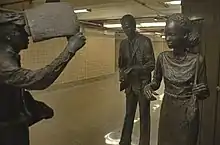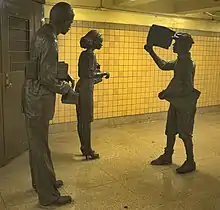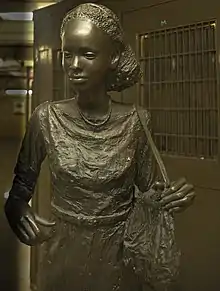Grigory Gurevich
Grigory Gurevich is a painter, sculptor, graphic artist, photographer, illustrator, bookmaker, mime and inventor. Originally from Leningrad (Saint Petersburg), Russia, he now resides in Jersey City, New Jersey.
Grigory Gurevich | |
|---|---|
| Born | 1938 (age 84–85) Leningrad (Saint Petersburg), Russia |
| Known for | Painting, sculpture, graphic arts, photography, illustrator, bookmaking, pantomime |
| Notable work | The Commuters, Reflections, 1-10; 10-1 |
Early life
The son of an architect, Grigory Gurevich was born in 1938 December 26 in Leningrad (Saint Petersburg), Russia.[1] At the beginning of World War II, he and a small group of children were evacuated to Kashtak, Siberia, and while parents weren't allowed to go, his mother jumped on the train.[2] Following the war, the family reunited in Saint Petersburg to find their apartment occupied, forcing them to stay with his aunt, living in her dining room.[3] His father created the design for Dubna, a "city of science" near Moscow, but instead of receiving the financial grant (the Lenin Premium), he was given the medal for the defense of Leningrad, and was later fired by the Leningrad GSP-11 Institute for being a Jew and never having been a member of Communist Party, leading to financial difficulties for the family and the divorce of Gurevich's parents.[2][4][5]
As an artist, Gurevich's work was first exhibited in the United Exhibit of Artists in Moscow when he was fifteen, and he went on to study art, receiving a master's degree in art in 1961 from the Academy of Fine and Industrial Arts of Saint Petersburg.[6] With a portion of his study devoted to architecture, he designed interiors, classrooms and laboratories, including furniture, then participated as an interior designer in a project with Architect Voronihina for Pushkin Museum, as well as designing Moscow's Winter Stadium.[7] His first solo exhibition was held in 1971 at the Architectural House in Leningrad.[8]
Mime
In 1961, Gurevich saw a performance by Marcel Marceau in Leningrad, which inspired him to spend the next eight years studying the art of mime, creating his own professional group in 1966, the first professional mime company in Russia.[9][10] His company went on a six-month tour of Asia, where they met up and toured with Marceau.[7] Gurevich went on to study under and establish a friendship with Marceau.[11] On his return to Moscow, his company merged with the State Theatre of Satire, which was run by Arkady Raikin, who was famous enough for Gurevich to be able to perform freely without facing pressure from government censors.[7]
Emigration
After he split with Raikin three years later, he found that due to the philosophical nature of his performances, Gurevich faced increasing censorship from Soviet authorities, making it difficult to find performance space, and ultimately resulting in his emigration to the United States in 1976.[12] Aided by the Hebrew Immigrant Aid Society (HIAS) and Niana, groups that helped Jews emigrate, he first traveled to Vienna and then Italy, before arriving in the U.S. without knowing English and with just $90 in his pocket.[7] He was placed at the Hotel St. George in Brooklyn Heights with other Russian immigrants, working jobs that included driving his car as a car service, antique restoration, jewelry design and carpentry.[3][13] During this time he established Grigur's Pantomime Theatre as a non-profit organization in 1979, touring throughout the world.[3][11][14] After relocating to Jersey City, the theater was awarded a $5,000 grant in 1981 from the New Jersey Council of the Arts in order to expand its facilities.[12] At the theatre, he also taught classes in pantomime.[15][16] In 1984, he became a citizen of the United States.[3]
Art career
Although Gurevich continued to perform and teach pantomime, he dissolved his company in order to focus on art and teaching, ultimately conducting over three hundred exhibitions in the United States and Europe, as well as over two hundred sculpture workshops.[17] He studied graphic and mechanical design at Parson's School of Design, and became a faculty member of Newark School of Fine and Industrial Arts, where he taught sculpture, drawing and jewelry until school was closed by Board of Education by City of Newark in 1996, and also Douglas College in New Brunswick.[7][18] He also served as a professor at St. John's University in New York and a faculty member at the Newark School of Fine and Industrial Arts.[19] His media varies, including works in pen and ink, drawings, jewelry, ceramics and watercolors.[20][21][22]
The Commuters



He is well known for his sculpture, with his most famous work being The Commuters.[23][24] Sculpted in 1985, The Commuters is the result of a commission.[25] The series of seven statues, which depict commuters from 1935, are plaster casts from real life figures, created and donated in 1984 by a class from the Newark School of Fine and Industrial Art.[26] Gurevich then had the life-sized figures, as well as a ticket booth, cast in bronze.[27] The piece is now on permanent display in Newark's Penn Station.[28]
Art books
In 1992, Gurevich turned his focus toward art books.[6] His book Reflections is a series of 17 linocuts, etchings and mixed media prints.[29] The book pairs Gurevich's artwork with the poetry of Florence Freedman, which are written in calligraphy by Gurevich's wife, Erika Wittmann-Gurevich.[30] It's now part of the print collection of the New York Public Library, the rare book collection of the Newark Public Library, and the Hermitage Museum, in St. Petersburg, Russia.[31] In 1995, he was awarded a patent for a manifolding book.[32] His manifolding or kinetic books are in the collection of artist's books at Columbia University, with one – 1-10; 10-1 – in the library of the Brooklyn Museum.[33][34][35]
Arts on the Hudson
In 1998, Gurevich founded an after-school art program called Arts on the Hudson.[8][36] He had discovered that his son's school didn't have an art program, so he decided to found one himself, teaching art classes to anyone five years and older, starting with a $1,000 grant he received from the Hudson County Community Affairs, followed by additional funding from the Geraldine R. Dodge Foundation, which came to about $70,000.[37] The programs included drawing, painting, music, African dance, stained glass, sculpture, martial arts, pantomime and web design.[38][39] During this time, he was also conducting a regular series of sculpture workshops throughout New Jersey and New York, and for three years he led acrylic painting workshops at Union Hill High School, with the result being eleven murals in the Main Hall of the school.[36][40][41]
TV appearance
Gurevich played Sergei Perlman in "Disappearing Acts", a 1999 episode of the TV series Law & Order: Special Victims Unit.[42][43]
See also
References
- "Grigory Gurevich". The New York Art Review, Page 618. 1988.
- "2010 Avtomat Grant Candidates". Avtomat Productions. Retrieved 2013-06-26.
- Prof. Sasha Saari, chairperson (June–August 2010). "Preview of the Russian Artist" (PDF). Around Our World, Volume 14, Issue 2. Archived from the original (PDF) on 2016-03-04. Retrieved 2013-07-16.
- "Scientists of the Siberian branch of the Academy of sciences - winners of Lenin premium". Prometeus.nsc.ru. Retrieved 2013-07-08.
- Kruglov, Arkadii (2002-08-15). The History of the Soviet Atomic Industry - Arkadiĭ Konstantinovich Kruglov - Google Books. ISBN 9780415269704. Retrieved 2013-07-08.
- Artist Details. "Artist Detail". art4business. Retrieved 2013-06-26.
- Caterine Lombardj (1982). "Grigory Gurevich and the Art of Pantomime". State of the Arts, Vol.1 #2.
- The Angel Orensanz Foundation (2011). "Grigory Gurevich - Art Exhibition: " We Shall Always Remember"" (PDF). Russian Arts Festival.
- "Temple Shaaray Tefila - New York City". Shaaraytefilanyc.org. 2013-02-03. Archived from the original on 2013-06-17. Retrieved 2013-06-26.
- Marian Courtney (February 25, 1983). "Portraying the waves of harmony". The Jersey Journal.
- Mildred Jailer (June 29, 1980). "Emigres Enliven Jersey City". The New York Times.
- Alexander Glasse (August 1981). "Grigory Gurevich: A Retrospective". Novoye Russkoe Slovo.
- "Russian Mime, Censored by Soviet Union, Performs at St. Anns Art Center". Brooklyn Heights Press. April 9, 1981.
- Marian Courtney (March 23, 1981). "Gurevich building a new career". The Jersey Journal.
- Shirley Mathews (March 12, 1984). "The silence of mime has a lot to say". Advocate.
- Grigory Gurevich
- Mercer County Community College (2010). "Grigory Gurevich" (PDF). Mercer County Arts Festival.
- Published: January 12, 1997 (1997-01-12). "Going Once, Going Twice: A School of Art - Page 2 - New York Times". The New York Times. Retrieved 2013-07-12.
- "Microsoft Word - 2009 Schedule final.doc" (PDF). Retrieved 2013-06-26.
- "Official Jersey City Tourism and Travel Information". M.destinationjerseycity.com. Retrieved 2013-06-26.
- Henkes, Robert (January 2003). The Crucifixion in American Art - Robert Henkes - Google Books. ISBN 9780786414994. Retrieved 2013-06-26.
- "Art of Grigory Gurevich". YouTube. 2009-01-10. Retrieved 2013-06-26.
- Published: January 12, 1997 (1997-01-12). "Going Once, Going Twice: A School of Art - Page 2 - New York Times". The New York Times. Retrieved 2013-06-26.
- Adam Weisman (July 26, 1984). "Grigory Gurevich, exiled Russian - Renowned mime in private show". The Advocate, EXTRA, Page 3.
- "world.nycsubway.org: Newark, New Jersey Light Rail/City Subway". Nycsubway.org. Retrieved 2013-06-26.
- "The Newark Metro: What the Commuter Does Not See". Newarkmetro.rutgers.edu. Retrieved 2013-06-26.
- "NJT Major Stations Newark Penn Station". Stationreporter.net. 2011-03-20. Archived from the original on 2012-04-21. Retrieved 2013-06-26.
- Sue (2012-10-17). "Hidden New Jersey: Art and history below the streets of Newark". Hiddennj.com. Retrieved 2013-06-26.
- Russ, Nadia (August 2009). Neopoprealism Starz: 21st Century Art Compendium of New Millennium ... - Nadia Russ - Google Books. ISBN 9781441570857. Retrieved 2013-06-26.
- Durso, Christopher (2011-08-07). "Putting Experiences To Poetry At 84, She Has Published Her 2d Volume Of Verse. - Philly.com". Articles.philly.com. Retrieved 2013-06-26.
- "The Hudson Artists of NJ, Inc. 54th Annual Regional Art Exhibit. 2007 - Home". Artnewjersey.weebly.com. Retrieved 2013-06-26.
- "Patent US5403237 - Manifolding book article - Google Patents". Retrieved 2013-06-26.
- "Celebrity Gossips & Top Stories: February 2009". Celebritygossipscrazy.blogspot.com. 2009-02-23. Retrieved 2013-06-26.
- "New York Art Resources Consortium /BM". Library.brooklynmuseum.org. 2008-02-15. Retrieved 2013-06-26.
- Gurevich, Grigory (1993). Grigory Gurevich: Numbers 1-10 10-1 - Grigory Gurevich - Google Boeken. Retrieved 2013-06-26.
- "Hudson Reporter - Fine arts at the Park Theater hosts annual festival". Bayonnecommunitynews.com. 2003-05-16. Retrieved 2013-06-26.
- "Learning for young and old Nonprofit brings the arts to downtown". Hudson Reporter. 2003-01-31. Retrieved 2013-06-26.
- "Creative classes for children Arts program provides after school activities". Hudson Reporter. 2001-11-09. Retrieved 2013-06-26.
- "Don't our children deserve the best after school education". Hudson Reporter. 2003-01-31. Retrieved 2013-06-26.
- "INTERNATIONAL ART COMPETITION 2013". Newartfestival.com. Retrieved 2013-07-12.
- "Heart of the city High School students near completion of mural project". Hudson Reporter. 2005-05-17. Retrieved 2013-07-08.
- Bergen Community College (2013). "EASY STEPS TO SCULPTING THE HUMAN HEAD - Grigory Gurevich". Bergen County Teen Arts Festival.
- Green, Susan; Dawn, Randee (September 2009). The Law and Order: Special Victims Unit Unofficial Companion - Susan Green, Randee Dawn - Google Books. ISBN 9781935251880. Retrieved 2013-06-26.